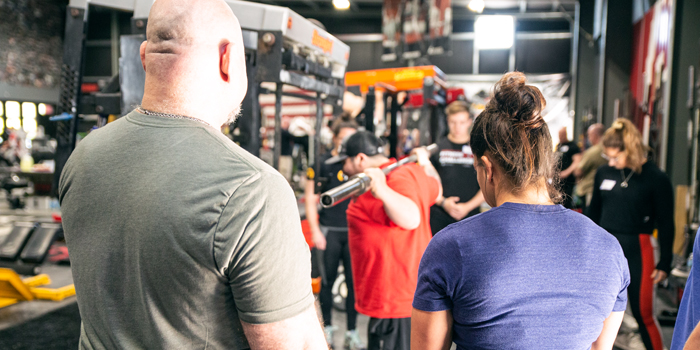
I am very fortunate that I get to train at a gym full of lifters who are continually striving to better themselves and others. Everyone is always watching, coaching, learning, helping.
I know there are a lot of people who train in groups but the groups don’t offer much in the way of helping each other become better. I understand not everyone is going to have people like Dave around to offer advice but anyone from beginner to advanced lifters can contribute something to a training group.
Here are the two worst types of training partners: 1) nonexistent or flaky training partners 2) training partners that just act as cheerleaders and don’t offer anything of substance. At that point they are just spotters. Having people to spot and load are great but what are they doing to make you better?
You don’t have to be an expert lifter to make your training partners better. You just have to always be actively watching and engaged in training.
Here is how you can be an asset to your group- even as a newer lifter.
Offer Helpful Cues
I hate generic cues that offer nothing of substance. They are just noise. I would rather hear NOTHING than random cues that aren't applicable or hype up words. I’m thinking about my technique and executing a lift the right way. Random shit isn’t going to help that.
Here are some tips for cueing which will help you be a better training partner even if you are a newer lifter:
Don’t be afraid to try a bunch of cues. You may give 25 cues and the 26th one does the trick. It may not even sound like what you were initially trying to achieve but as long as it works for the lifter and they do what they should, then it’s a good cue. Here is a log I wrote about finding the right cues for our training group during a speed squat session.
Telling someone to “keep their lats tight” might not mean anything to them. But telling them to pull their elbows to their side or grip the bar like they are doing a lat pull or poking at their lats to help them engage them might work. Find what works and stick with it until the lifter does it without anyone telling them to do it.
Help someone figure out what works for them. Sometimes you can’t find the right cue. Sometimes a set looks great. Where did that perfect set of squats come from? Ask what they did differently. They might tell you “I spread the floor this time instead of twisting my feet” or “I thought about keeping my shoulder blades down and back instead of just back”. Now you know how to cue them. You’re not only helping them figure out what they did correctly to cement it in but learning how to help them get there in the future.
If you’re not sure what cues will help, ask the lifter what cues are helpful for them. I do this all the time. I would rather say nothing at all than a cue that is the opposite of what someone needs to hear. Here’s an example: Joe was squatting the other day. I am always there to spot him or run the rack but we don’t train in the same little group so I don’t know everything he is working on all the time. He mentioned before his set that he was working on keeping his chest up out of the hole when he squats. So I asked him “what cue do you like? Chest up? Head up? Back in the bar?” He told me “chest up” was a good one. So I used that instead of picking a random cue that maybe I would want to hear.
Offering the wrong cue is not only not helpful but can sometimes be detrimental if a lifter is not that comfortable with their technique. Obviously that is not the case with an experienced lifter like Joe but a newer lifter might do exactly what you say and you could just be rattling off random cues you think sound good even if the lifter doesn’t need it. A seasoned lifter can filter out useless cues but a newer lifter will heed them and potentially do something wacky.
Find Weak Points
What’s lagging? What needs to be worked on to get better? This one takes a little training under your belt to be able to identify but if you train with the same people on a regular basis, it will be easy to spot. What always goes wrong in their lifts? Where do they fail? Are they noticably weaker on certain accessories than everyone else?
It’s hard to always have the answers if you are under the weight. You are too busy actually lifting. That’s where other sets of eyes help. You don’t need to have all the answers (there are plentiful resources on eliteFTS to help you if you can determine where you are failing in a lift) but you can help your training partners identify what is going wrong.
Be Honest
Your job is not to pretend your training partners are great at everything. Your job is to help them get better. It doesn’t take extensive training knowledge to hold your training partners accountable when they need it.
Did your training partner do a set that looks like shit and they should cut it there? Let them know. Don’t just blow smoke up their collective butts. Are they not listening to cues? Help them figure it out instead of getting bored and giving up. Are they sandbagging? Skipping accessories they aren’t good at since they don’t like to do them? Politely tell them they are being a lil bitch and they should step it up. Or do more than they do and they will need to step it up.
We have had a number of people come into to train who have gotten noticeably stronger by just being forced to work on their weak points and making it through a whole workout instead of leaving whenever they want. You don’t have to have a pro total to help your training partners stick to the program.
Next time you’re in the gym, think about what you could be doing to help your crew get better. Are you just there to spot each other or are you actively working on getting stronger?










1 Comment